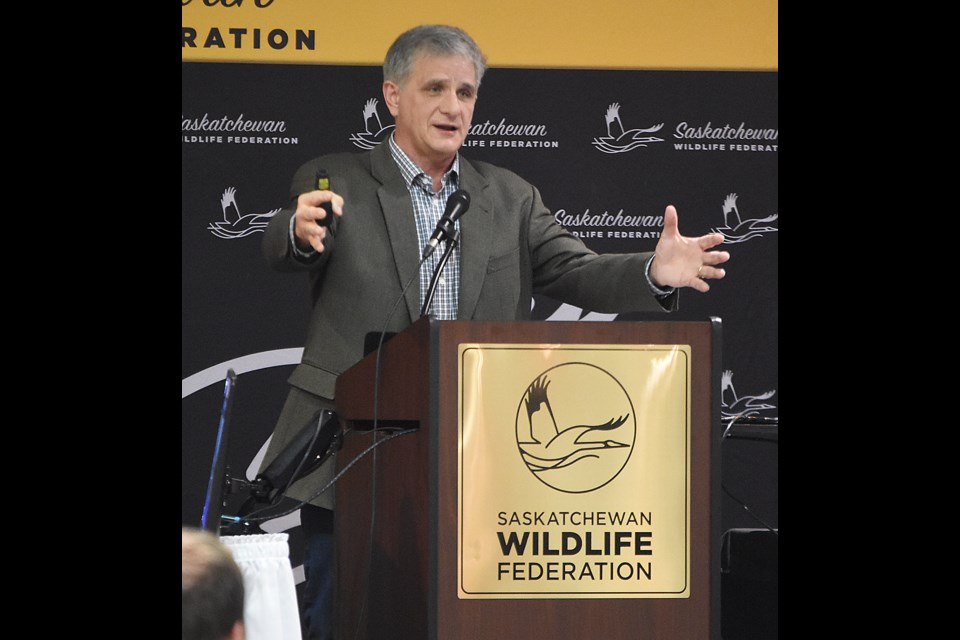Bruce Vincent's presentation to the Saskatchewan Wildlife Federation during their 90th annual convention at the Heritage Inn on Saturday didn't mince words.
Pictures of raging forest fires, dead and dying timberlands and even a river on fire painted a picture of an environment that has been fought over and simultaneously ignored for decades. And enough is enough.
The time for fighting over the environment is over, said the longtime forestry and logging advocate. Now's the time for dialogue, education and engagement, all with the focus of showing the public just what forestry means to the environment and how positive progress in those areas can make an immense difference in the future of not only the industry, but the planet itself.
That was the message Vincent carried through his keynote address Saturday, as he brought his own personal experience and beliefs forged through involvement and contact with the public to the podium..
“I was a leader of the movement to get common sense forestry put in place in the States, I confused fighting with leading and while fighting made the front page of newspapers, it did nothing for forestry and nothing for our culture,” he said shortly after his address and a long line of book signing. “So we had to back away from that and learn how to lead.”
Vincent comes from a position of experience. A third generation forester and logger, he has spoke at events throughout the United States, Canada, and all over the world. He has testified before Congress on resource issues and has appeared on programs such as '60 Minutes'. Vincent's list of awards and recognitions is long, having been named the National Forest Advocate of the Year, received the Presidential Preserve America Award and named the Timberman of the Year in Montana, just to name a few.
So when he speaks, people tend to listen. And his message is now one of unity as opposed to antagonism and ridicule.
“Leading's first step is listening,” Vincent explained. “What does a public think is going on, because they are four generations from the farm, they have the Disney Channel, the wolves don't raise rabbits in real life. So we have to hear them, then craft solutions with them that they find acceptable and we can make work on the ground. When we do that, actually do lead and own the environmental movement, it's ours and things change.
“Laughing at them and having convoys and rallies, that doesn't do anything other than antagonize people... there might be a time to fight again, but that's when leading has been exhausted.”
While much of Vincent's work has focussed on the world of forestry and logging, he feels similar issues are taking place in this part of the world when it comes to managing the prairies.
“There's no difference between proper forest management and proper prairie management,” he said matter-of-factly. “The question is 'what do we want?' What do people in Saskatchewan want this place to look like in 200 years? That's a starting point, and we have to back up from it. How do we get there?”
For that answer, Vincent recommends a bit of reading, specifically the Pulitzer Prize winning book '1491' by New York Timees writer Charles Mann. Mann's exhaustive research into the pre-Columbus years in North America paint a vastly different picture compared to the one taught in history classes.
“This area has been managed by humans for 10,000 years,” Mann said. “It's a really good look at what was going on here. We don't get the true story; there was an vibrant existent culture in North and South America and they managed the forests, they managed the prairies, they managed the wildlife for 10,000 years. It wasn't this prisitine untouched mecca that we were told it was, it was a garden.
“So how do we replicate that, and understand that humans need stuff?”
Unfortunately, the damage has been done. A lot of it. And nature isn't happy about.
“We can't pretend that nature, after 150, 200 years of European settlement, will weigh in and be benign,” Vincent said. “So we need to weigh in and talk to the public and straight up find out what the issues are and then deal with them... society as a whole is starving for hope, that there's a place for man on this planet and we aren't going to destroy it and we're moving incrementally forward.”
To that end, Vincent makes a salient point.
“The Cuyahaga River is not burning,” he said. “You can fish and swim in the Great Lakes again. Are there issues? Absolutely. They're global issues we have to deal with. And just locking our environment up because we want to have a playground? That could drive environmental chaos in countries that are still developing and trying to feed themselves.
“So we have to be smart about this, engage the public and do the right thing to save and protect the environment.”




